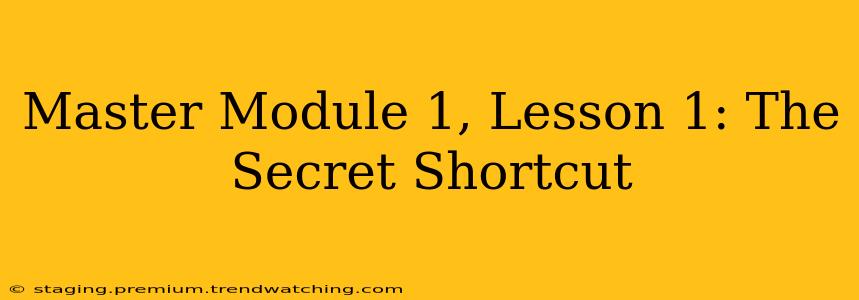Welcome to the first lesson of Master Module 1! This lesson unveils a powerful, often overlooked secret to dramatically accelerating your learning process: metacognition. Before we dive into the specifics, let's address a common misconception: there's no magic bullet. There's no single technique that will instantly transform you into a learning prodigy. However, understanding and actively employing metacognition—thinking about your thinking—is the closest thing we have to a secret shortcut.
What is Metacognition?
Metacognition, simply put, is awareness and understanding of your own thought processes. It's about actively monitoring and regulating your learning strategies. This involves not just passively absorbing information, but consciously reflecting on how you're learning it. Are you understanding the concepts? What strategies are working effectively? Where are you struggling? By actively engaging in these questions, you unlock a significantly more efficient learning pathway.
How Does Metacognition Accelerate Learning?
Metacognition enhances learning in several key ways:
-
Improved Planning: Before tackling a learning task, metacognitive learners plan their approach. They consider their existing knowledge, identify learning objectives, and select appropriate learning strategies. This preemptive planning significantly reduces wasted effort and frustration.
-
Enhanced Monitoring: During the learning process, metacognitive learners constantly monitor their understanding. They actively check for comprehension gaps, identify areas of confusion, and adjust their approach accordingly. This proactive monitoring prevents misconceptions from solidifying.
-
Effective Regulation: After completing a learning task, metacognitive learners reflect on their performance. They evaluate the effectiveness of their chosen strategies, identify areas for improvement, and adjust their approach for future tasks. This iterative process continuously refines their learning techniques.
Why is Metacognition Often Overlooked?
Many people approach learning passively, simply absorbing information without critically evaluating their own learning process. This passive approach can lead to inefficient learning, wasted time, and ultimately, frustration. The secret shortcut of metacognition often remains untapped because it requires conscious effort and self-reflection, qualities not inherently present in all learning styles.
How Can I Develop My Metacognitive Skills?
Developing strong metacognitive skills is a journey, not a destination. Here are some practical strategies:
-
Self-Questioning: Regularly ask yourself questions like: "What am I learning?", "How am I learning it?", "What strategies are working best?", and "Where am I getting stuck?"
-
Regular Reflection: Set aside time to reflect on your learning experiences. What went well? What could be improved? What strategies will you use next time?
-
Seek Feedback: Actively seek feedback from teachers, peers, or mentors to gain an external perspective on your learning process.
-
Experiment with Different Strategies: Try different learning techniques (e.g., spaced repetition, active recall, Feynman technique) and observe which ones are most effective for you.
What are Some Common Metacognitive Strategies?
Several well-established learning strategies leverage metacognition:
Spaced Repetition: This technique involves reviewing material at increasing intervals, enhancing long-term retention. The metacognitive element lies in actively monitoring your recall and adjusting the spacing based on your performance.
Active Recall: This involves actively retrieving information from memory, rather than passively rereading. The metacognitive aspect is the conscious effort to test your understanding and identify knowledge gaps.
Feynman Technique: This technique involves explaining a concept in simple terms, as if teaching it to someone else. The metacognitive component is identifying areas where your understanding is weak because you struggle to explain it clearly.
What are the Benefits of Using Metacognitive Strategies?
The benefits extend beyond simply improved grades. Mastering metacognition enhances your problem-solving skills, critical thinking abilities, and overall cognitive flexibility. These are invaluable assets in any field, translating to increased efficiency and success in all aspects of life.
This first lesson has introduced the foundational concept of metacognition and its importance in accelerated learning. The subsequent lessons will delve deeper into specific metacognitive strategies and techniques to help you unlock your full learning potential. Remember, the secret shortcut to mastering any subject lies in understanding and actively managing your own thinking process.

